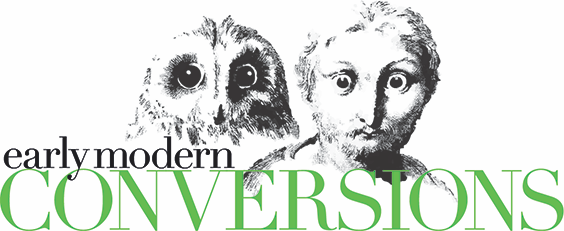Professor Matthew Dimmock (Sussex) and Dr Helen Smith (York) will be leading a 2014 Shakespeare Association of America seminar on the topic of ‘Conversions / Conversations: the Language of Religious and Cultural Encounter’, which may be of interest to members of the Early Modern Conversions Project. Members are welcome to apply to the seminar through the standard SAA process, but Matthew and Helen will also be delighted to hear informally from project members. The conference opens on Thursday, 10 April 2014 and closes on Saturday, 12 April.
The seminar is designed to address directly the linguistic and cultural transformations wrought by the language of conversion. Our discussions will centre around four key themes:
– how the terms of conversion as a process of material change (the conversion of monasteries into houses, for example, or of lead into gold) intersect with and illuminate ideas of religious change, and the dynamics of translation, transformation, and transmission more generally.
– the range and implications of the rich vocabulary of conversion, and the literary, linguistic, and cultural centrality of the terms of schism, apostasy, turning, heresy, reconciliation, and reprobation.
– how and why religious change is described and addressed in terms that appear to deliberately sidestep the language of conversion or the precise terminology of religious affiliation.
– the etymological and imaginative connections between conversion and conversation, and the centrality of dialogue (often mediated or distanced) both to accounts of religious change and to the vibrant fictions of conversion that mark this period.
The seminar will establish the language of religious change as central not only to the rhetorical and linguistic but to the conceptual and material structures of the English Renaissance. It will trace how the terms of conversion (a process at once of transformation and return) is developed, re-articulated, and expressed across a rich variety of literary forms, from drama to travel narratives, sermons to lyric verse, and household books to books of secrets, friendship albums, and commonplace collections.
For further details, please see the seminar program.
